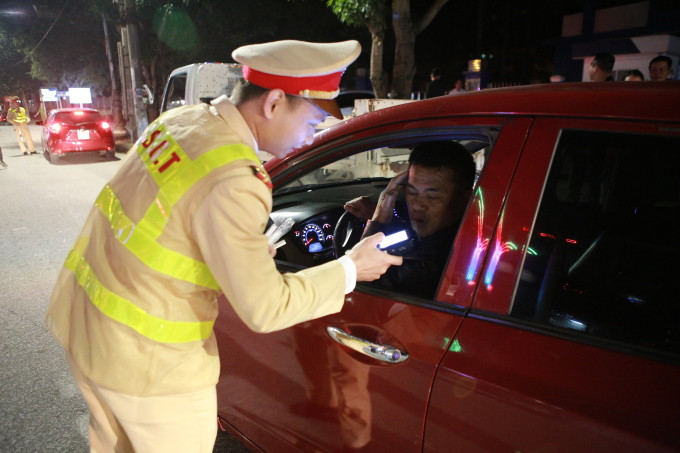Dr. Tran Huu Minh, Chief of Office of the National Traffic Safety Committee, said that it is necessary to criminally prosecute drivers who violate the alcohol concentration limit of 3 even if they have not caused any consequences.
At the workshop "The harmful effects of alcohol and beer on road traffic participants" organized by the Ministry of Public Security in coordination with the Ministry of Health on January 29, Dr. Tran Huu Minh assessed that the administrative penalty for drivers violating alcohol concentration is at a relatively high level, with good deterrence.
However, current law stipulates that people with alcohol levels of level 3 (over 0.4 mg/liter of breath or over 80 mg/100 ml of blood) will still receive the same penalty, no matter how high. "For example, people who drink 5 glasses of beer or 30 glasses of beer can be fined at the same level. This is not entirely consistent with the basic principle of administrative sanctions, which is to impose a penalty commensurate with the level of violation," said Mr. Minh.

Dr. Tran Huu Minh, Chief of Office of the National Traffic Committee
Therefore, the Chief of Office of the National Traffic Safety Committee proposed that if the alcohol concentration exceeds level 3, it should still be divided into higher administrative penalties. For drivers who violate alcohol concentration especially seriously, leading to complete loss of control, possibly causing a catastrophic traffic accident, they should be criminally prosecuted.
"This is the case mentioned in Clause 4, Article 260 of the Penal Code, and can be completely prosecuted even if there are no consequences," Mr. Minh cited.
According to this law, traffic violations that can lead to consequences such as killing 3 people or more, causing property damage of 1.5 billion VND or more... if not prevented in time, can be punished with up to 1 year in prison.
According to Mr. Minh, in order to have sufficient grounds for criminal proceedings, professional agencies, especially the health sector, need to have documents stipulating what level of alcohol concentration violations are particularly serious, causing the driver to completely lose control and should be handled according to Clause 4, Article 260 of the Penal Code. From there, the Supreme People's Court's Judicial Council can issue instructions for competent agencies to implement the provisions of the Code.
Mr. Minh said that the National Traffic Safety Committee had previously proposed and the Ministry of Justice had sent a document requesting the Supreme People's Court's Judicial Council to consider this content.
Agreeing with the above proposal, Associate Professor Dr. Vu Anh Tuan, Director of the Vietnam-Germany Transport Research Center, said that developed countries such as Europe and Japan all have regulations on criminal penalties for violations of alcohol concentration that can cause traffic safety problems. First of all, there will be administrative penalties. If the violation level continues to escalate, criminal penalties will be applied, both fining and imprisoning violators.
According to Mr. Tuan, the risk factor of drinking and driving is the "number one danger" so it is necessary to apply increasing penalties. Until the effectiveness is achieved, stronger measures must be taken, such as criminal prosecution. "Drivers can easily pay tens of millions of dong to pay fines if they violate the law, but if they are imprisoned, they will be afraid," he said.
Dr. Le Thu Huyen, University of Transport, also said that most countries consider drunk driving a crime, and if serious, can be prosecuted even if there are no consequences. Drivers also have their violation records kept and are subject to progressive penalties if they re-offend.
Currently, the highest fine for drivers with a blood alcohol concentration exceeding 80 mg/100 ml or exceeding 0.4 mg/liter of breath is 30-40 million VND, with a license revocation of 22-24 months. Dr. Huyen proposed that this level should be divided into 80-160 mg/100 ml, 160-240 mg/100 ml to increase the penalty according to the level of violation. If the driver has a blood alcohol concentration higher than 240 mg/100 ml, he or she may be imprisoned.

Traffic police measure driver's alcohol concentration (illustrative photo)
In November 2023, the regulation on penalties for people driving under the influence of alcohol caused controversy when the National Assembly discussed the draft Law on Road Traffic Safety. Many delegates said that the current regulation on absolute prohibition of people driving under the influence of alcohol is not appropriate and that a limit should be designed to set the penalty level.
Reviewing the draft law, the National Defense and Security Committee said that some opinions in the committee also suggested considering an absolute ban on alcohol concentration while driving because it was "too strict and not really suitable for the culture, customs and habits of a part of the Vietnamese people". These members suggested referring to international experience and regulating alcohol concentration at an appropriate level for each type of vehicle, ensuring consistency with the provisions of the Penal Code.
The bill is expected to be considered and passed by the National Assembly at its mid-2024 session.
TB (according to VnExpress)